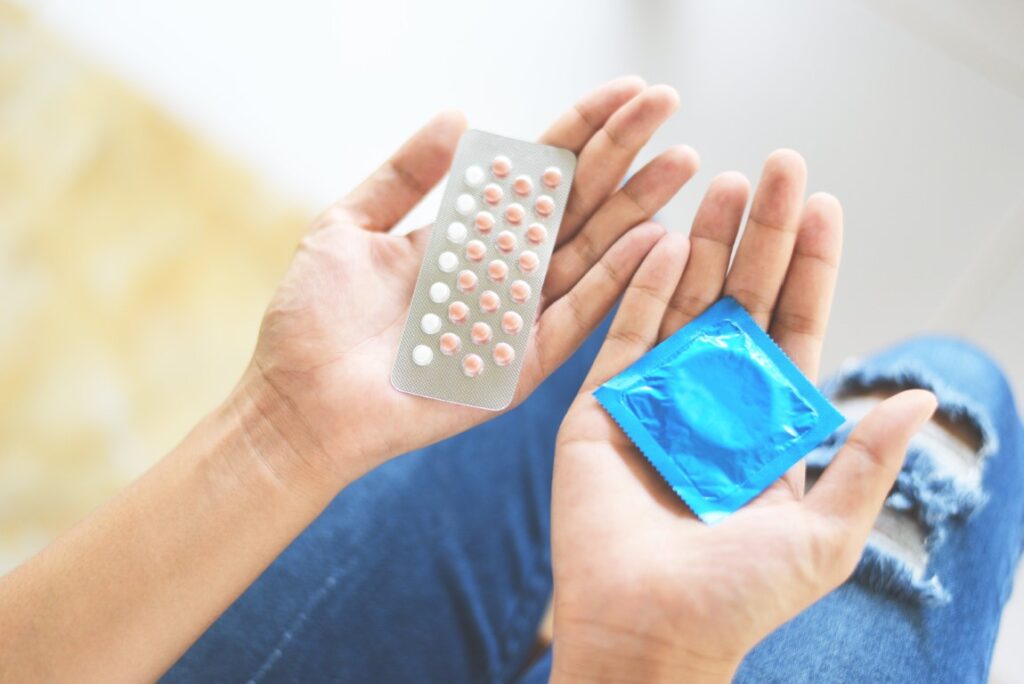You may be familiar with the importance of using condoms to prevent sexually transmitted diseases, but did you know there are several other effective methods you can incorporate into your routine?
From getting vaccinated to staying informed about the latest developments in STD prevention, there are numerous strategies you can implement to safeguard your sexual health.
These top 10 methods are not only practical but also essential for maintaining a proactive approach to protecting yourself and your partners.
Practice Safe Sex
To prevent sexually transmitted diseases, always remember to use protection during sexual activities. Consent awareness is crucial in any sexual encounter. Communication and mutual agreement are key aspects of ensuring that both partners are comfortable and willing.
Understanding and respecting each other's boundaries is essential for a healthy and consensual relationship. It's important to prioritize your sexual health by discussing contraception options with your partner. Condoms are highly effective in preventing the transmission of STDs and are easily accessible.
Additionally, considering other forms of contraception, such as birth control pills or IUDs, can provide added protection against unintended pregnancies. Remember that taking control of your sexual health is empowering and shows that you value yourself and your partner.
Get Vaccinated
When considering ways to protect yourself from sexually transmitted diseases, getting vaccinated is an essential step in safeguarding your sexual health. Vaccines play a crucial role in preventing certain sexually transmitted infections, offering you a layer of protection beyond just practicing safe sex. Here's why getting vaccinated is a smart choice:
- Vaccine effectiveness: Vaccines are highly effective at preventing specific sexually transmitted diseases, such as HPV and Hepatitis B, reducing your risk of contracting these infections.
- Immunization benefits: By getting vaccinated, you not only protect yourself but also contribute to the broader community's immunity against sexually transmitted diseases.
- Peace of mind: Vaccination can provide you with peace of mind, knowing that you have taken proactive steps to safeguard your sexual health.
- Long-term protection: Many vaccines offer long-lasting protection, ensuring you stay safe from certain sexually transmitted diseases for an extended period.
Make an informed decision about getting vaccinated to prioritize your sexual well-being and enjoy the freedom of a protected and healthy lifestyle.
Use Protection
When it comes to preventing sexually transmitted diseases, using protection is key. Condoms are your best friend when it comes to safer sex, providing a barrier that can greatly reduce the risk of infections.
It's important to practice safe sex by using barrier methods consistently and correctly to protect yourself and your partner.
Condoms for Safer Sex
Consider using condoms as a reliable method to ensure safer sex practices. Condoms are highly effective in preventing sexually transmitted diseases (STDs) and unwanted pregnancies. Here are some reasons why you should prioritize using condoms:
- Protection: Condoms act as a barrier, reducing the risk of STD transmission.
- Empowerment: Taking charge of your sexual health by using condoms gives you control.
- Comfort: Condoms come in various sizes, textures, and materials to enhance pleasure.
- Confidence: Using condoms can give you peace of mind and make your sexual encounters worry-free.
Importance of Barrier Methods
To ensure optimal protection against sexually transmitted diseases, prioritizing the use of barrier methods is essential for maintaining your sexual health.
Barrier methods, such as condoms and dental dams, are highly effective in preventing the transmission of STDs during sexual activity. These methods create a physical barrier that reduces the risk of coming into contact with bodily fluids that may harbor infections.
When considering contraceptive choices, remember that barrier methods not only help prevent unwanted pregnancies but also play a crucial role in safeguarding your overall well-being.
By incorporating barrier methods into your sexual practices, you take an active step towards protecting yourself and your partner.
Make informed decisions about your sexual health and embrace the freedom that comes with using effective barrier methods.
Safe Sex Practices
Prioritizing safe sex practices through the consistent use of protection is crucial for maintaining your sexual health and well-being. When it comes to practicing safe sex, remember to prioritize consent education and relationship boundaries.
Here are some key points to keep in mind:
- Always use protection: Condoms and other barrier methods reduce the risk of STD transmission.
- Open communication is key: Discussing sexual health and boundaries with your partner promotes a healthy and respectful relationship.
- Mutual respect: Respecting each other's decisions and boundaries fosters a safe and trusting environment.
- Regular testing: Getting tested for STDs regularly ensures early detection and treatment if needed.
Limit Sexual Partners
When it comes to limiting sexual partners, it's essential to prioritize partner selection, communication, and trust.
Choosing partners wisely and having open discussions about sexual health can help reduce the risk of sexually transmitted diseases.
Building a foundation of trust with your partner can facilitate honest conversations about boundaries and safer sex practices.
Partner Selection
Consider carefully selecting and limiting your sexual partners as a proactive measure to prevent sexually transmitted diseases. When it comes to partner selection, setting clear relationship boundaries and maintaining open partner communication are vital. Here are some key points to keep in mind:
- Quality Over Quantity: Focus on building strong connections with fewer partners rather than having multiple casual encounters.
- Mutual Respect: Choose partners who respect your boundaries and prioritize your well-being.
- Regular Testing: Encourage partners to undergo regular STD testing to ensure both of your health and safety.
- Transparent Discussions: Have open conversations about sexual history, protection methods, and expectations to ensure a safe and consensual experience.
Communication and Trust
To establish a foundation of trust and open communication in your relationships, it's essential to limit your sexual partners thoughtfully and intentionally. Trust building and open communication are key components in maintaining healthy connections.
By limiting your sexual partners, you not only reduce the risk of sexually transmitted diseases but also create a space for deeper trust to flourish. When you choose to be selective with whom you engage intimately, you demonstrate care for yourself and your partners.
This practice fosters an environment where honest conversations about sexual health, boundaries, and concerns can take place freely. Remember, quality over quantity is crucial in building strong, secure relationships based on trust and open communication.
Regular STD Testing
Regular STD testing is crucial for maintaining your sexual health and well-being. It's an essential part of taking control of your health and ensuring early detection and treatment if needed. Here are some key points to consider:
- Routine Testing: Make regular testing a part of your healthcare routine, regardless of symptoms. Many STDs are asymptomatic, so getting tested even when you feel fine is important.
- Prevention Strategies: Testing isn't just about knowing your status but also about preventing the spread of infections. By getting tested regularly, you can take necessary precautions to protect yourself and your partners.
- Peace of Mind: Knowing your status can provide peace of mind and reduce anxiety about potential infections. It allows you to be proactive about your health and well-being.
- Empowerment: Regular testing empowers you to make informed decisions about your sexual health. It puts you in control and allows you to take charge of your well-being.
Communication With Partner
Engage openly and honestly with your partner about sexual health to foster a safe and trusting relationship. Building trust through open communication is crucial in preventing sexually transmitted diseases (STDs). Discussing your sexual health history, including past infections or testing, can help both partners make informed decisions. Encourage each other to get tested regularly and share the results. Remember, open communication is key to maintaining a healthy relationship.
Avoid Risky Behaviors
Openly discussing boundaries and setting clear expectations can help you avoid risky behaviors that increase the likelihood of contracting sexually transmitted diseases. When it comes to avoiding risky behaviors and promoting abstinence, there are key actions you can take to protect yourself:
- Prioritize Your Health: Remember that your health and well-being are important. Make choices that align with your values and protect your health.
- Know Your Limits: Understand what you're comfortable with and communicate this to your partner. Setting boundaries is essential in preventing risky behaviors.
- Stay Informed: Educate yourself about sexually transmitted diseases and their risks. Knowledge is power, and being informed can help you make better decisions.
- Seek Support: Surround yourself with people who respect your choices and support your efforts to avoid risky behaviors. Having a strong support system can make a significant difference in staying safe and healthy.
Educate Yourself
To protect yourself from sexually transmitted diseases, it's crucial to educate yourself about the risks and prevention methods available. Understanding how these diseases are transmitted is key to making informed decisions about your sexual health. STIs can be passed through vaginal, anal, or oral sex, as well as through sharing needles or coming into contact with infected bodily fluids. By being aware of these modes of transmission, you can take steps to reduce your risk.
Prevention strategies play a significant role in safeguarding yourself against STIs. Using condoms consistently and correctly during sexual activity, getting tested regularly, and discussing your sexual history with partners are all essential steps in staying informed and proactive. Additionally, staying up to date with accurate information from reputable sources can empower you to make responsible choices regarding your sexual health. Remember, knowledge is power when it comes to protecting yourself and your partners from sexually transmitted diseases.
Stay Informed
You hold the power to protect yourself by staying informed about sexually transmitted diseases. Understanding how these diseases spread and the importance of safe practices can help you make informed decisions about your sexual health.
Knowledge is your shield against the risks, empowering you to prioritize prevention.
Education Is Key
Understanding the importance of sexual health education plays a crucial role in preventing the spread of sexually transmitted diseases. Being informed empowers you to make smart choices and protect yourself and your partner. Here are some key points to consider:
- Early Intervention: Education can help you recognize the signs of STDs early, leading to timely treatment.
- Community Outreach: Engaging with community programs and resources can provide valuable information and support.
- Access to Resources: Education ensures you know where to find testing, treatment, and prevention methods.
- Breaking Stigma: Learning about sexual health helps break down societal taboos, encouraging open conversations and reducing judgment.
Stay informed, stay empowered, and take charge of your sexual health.
Knowledge Empowers Prevention
Empower yourself with knowledge to effectively prevent sexually transmitted diseases. Empowerment through education is key in staying informed and making healthy choices. By educating yourself about the risks, symptoms, and prevention methods of STDs, you can take control of your sexual health.
Prevention through awareness is crucial in protecting yourself and your partners. Stay informed about safe sex practices, regular testing, and open communication with your sexual partners. Knowledge empowers you to make informed decisions and reduces the risk of contracting STDs.
Seek Medical Help
To effectively address sexually transmitted diseases, seeking medical help promptly is crucial for accurate diagnosis and appropriate treatment. When it comes to your sexual health, it's essential to prioritize medical consultation and consider the various treatment options available. Here are some key points to keep in mind:
- Confidentiality: Medical professionals are bound by strict confidentiality rules, ensuring your privacy and comfort during consultations.
- Education: Doctors can provide valuable information about STIs, prevention methods, and treatment plans tailored to your individual needs.
- Testing: Regular testing can help detect STIs early on, allowing for prompt intervention and reducing the risk of complications.
- Support: Seeking medical help not only addresses physical health but also provides emotional support, guidance, and resources for overall well-being.
Frequently Asked Questions
Are There Any Alternative Methods to Prevent Sexually Transmitted Diseases That Are Not Mentioned in the Article?
To prevent sexually transmitted diseases, consider herbal remedies or counseling for additional protection. Engage in meditation and exercise to boost overall well-being. These alternative methods can complement traditional strategies and promote holistic health. Take control of your well-being.
How Effective Are Vaccines in Preventing All Types of Sexually Transmitted Diseases?
Vaccines are highly effective in preventing certain sexually transmitted diseases, like HPV and hepatitis B. However, they don't protect against all STDs. Public perception sometimes overlooks this, leading to misconceptions about vaccine limitations in STD prevention.
Can Sexually Transmitted Diseases Be Transmitted Through Non-Sexual Activities?
Yes, sexually transmitted diseases can be transmitted through non-sexual activities like sharing needles or coming into contact with infected blood. To prevent this, promote public awareness, debunk misconceptions, and encourage safer practices.
What Should I Do if I Suspect I Have Been Exposed to a Sexually Transmitted Disease but Do Not Have Symptoms?
If you suspect exposure to an STD without symptoms, reach out to healthcare professionals for testing and guidance. Seek counseling options for support, including joining support groups for emotional well-being. Your well-being matters.
How Often Should I Get Tested for Sexually Transmitted Diseases if I Am in a Monogamous Relationship?
You should get tested for sexually transmitted diseases at least once a year, even in a monogamous relationship. Regular testing helps maintain trust and provides a safety net. Prevention strategies are crucial, but testing ensures peace of mind.
Conclusion
In conclusion, taking steps to prevent sexually transmitted diseases is crucial for your overall health and well-being. By practicing safe sex, getting vaccinated, using protection, and staying informed, you can greatly reduce your risk of contracting an STD.
Remember to always prioritize your sexual health and seek medical help if needed. Stay educated, stay safe, and take control of your sexual health. Your future self will thank you.


